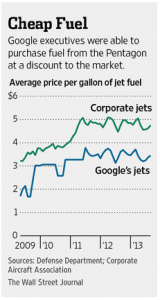As Journalism and Democracy Struggle, New America Caves to Google
In my analysis of the role of outside influence peddling on last year’s election, I harped on a number of issues. In addition to focusing on the long-standing right wing noise machine (Breitbart didn’t need Vladimir Putin to learn how to rat-fuck), I also noted that all of our politics is too easily driven by paid influence, whether from Russia, Qatar, or Defense Contractors. Finally, and perhaps most importantly, to the extent that fake news affected the election, it did so because the United States has allowed a handful of companies — chiefly, Facebook and Google — to concentrate power in Silicon Valley.
So to sum up this part of my argument: First, the history of journalism is about the history of certain market conditions, conditions which always get at least influenced by the state, but which in so-called capitalist countries also tend to produce bottle necks of power. In the 50s, it was the elite. Now it’s Silicon Valley. And that’s true not just here! The bottle-neck of power for much of the world is Silicon Valley. To understand what dictates the kinds of stories you get from a particular media environment, you need to understand where the bottle-necks are. Today’s bottle-neck has created both what people like to call “fake news” and a whole bunch of other toxins.
If we’re going to account for the weaknesses of our democracy, we need to account for the way our discourse gets channeled through two enormous companies whose primary interest is profit, not democracy.
Recent events at New America, which describes itself as “a think tank and civic enterprise committed to renewing American politics, prosperity, and purpose in the Digital Age,” demonstrate the risk.
When one of the leading commenters on the risk of concentration, Barry Lynn, applauded the EU’s judgment against Google — which is a major funder for New America — the think tank pulled his statement and fired him and his team.
The New America Foundation has received more than $21 million from Google; its parent company’s executive chairman, Eric Schmidt; and his family’s foundation since the think tank’s founding in 1999. That money helped to establish New America as an elite voice in policy debates on the American left.
But not long after one of New America’s scholars posted a statement on the think tank’s website praising the European Union’s penalty against Google, Mr. Schmidt, who had chaired New America until 2016, communicated his displeasure with the statement to the group’s president, Anne-Marie Slaughter, according to the scholar.
The statement disappeared from New America’s website, only to be reposted without explanation a few hours later. But word of Mr. Schmidt’s displeasure rippled through New America, which employs more than 200 people, including dozens of researchers, writers and scholars, most of whom work in sleek Washington offices where the main conference room is called the “Eric Schmidt Ideas Lab.” The episode left some people concerned that Google intended to discontinue funding, while others worried whether the think tank could truly be independent if it had to worry about offending its donors.
Those worries seemed to be substantiated a couple of days later, when Ms. Slaughter summoned the scholar who wrote the critical statement, Barry Lynn, to her office. He ran a New America initiative called Open Markets that has led a growing chorus of liberal criticism of the market dominance of telecom and tech giants, including Google, which is now part of a larger corporate entity known as Alphabet, for which Mr. Schmidt serves as executive chairman.
Ms. Slaughter told Mr. Lynn that “the time has come for Open Markets and New America to part ways,” according to an email from Ms. Slaughter to Mr. Lynn. The email suggested that the entire Open Markets team — nearly 10 full-time employees and unpaid fellows — would be exiled from New America.
New America insists that Google didn’t pull the plug on some of the most important (and still meager) work criticizing concentration.
New America’s executive vice president, Tyra Mariani, said it was “a mutual decision for Barry to spin out his Open Markets program,” and that the move was not in any way influenced by Google or Mr. Schmidt.
But this is in no way the first time they’ve catered to Google’s preferred policies. I’ve run up against it indirectly in surveillance fights, and others have far more directly.
So here we have a think tank which is doing necessary work carving out space on the left for policy. But it can’t investigate one of the most basic threats to our democracy, because doing so would quickly identify the danger of Google.
I get the need to attract and keep funding. But if this lefty think tank can’t research one of the forces that led to the election of Donald Trump, what good can it do?
Update: Here’s a link to Lynn’s new site.


